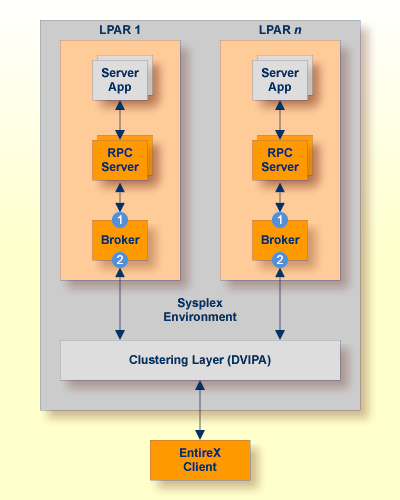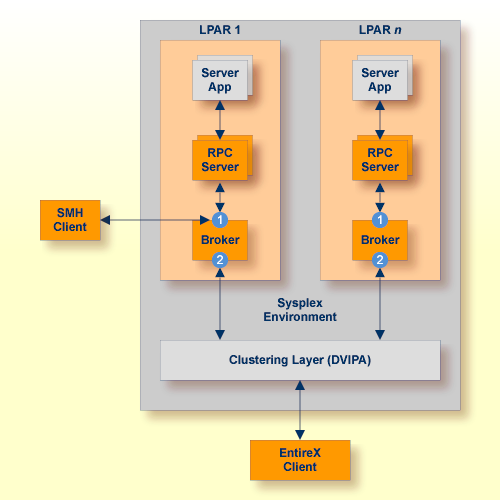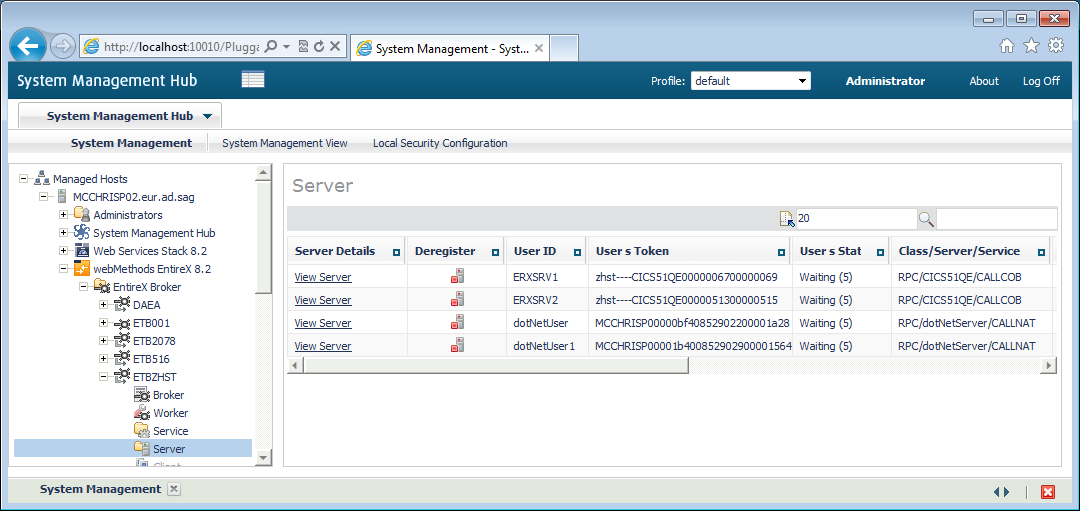Scenario: "I want to use Sysplex for my high availability cluster."
This document covers the following topics:

Segmenting dynamic workload from static server and management topology is critically important. Using broker TCP/IP-specific attributes, define two separate connection points:
One for RPC server-to-broker and admin connections. 
The second for client workload connections. 
See TCP/IP-specific Attributes under Broker Attributes. Sample attribute file settings:
| Sample Attribute File Settings | Note | |
|---|---|---|
 |
PORT=1972 |
In this example, the HOST is not defined, so the default setting will be used (localhost).
|
 |
HOST=10.20.74.103 (or DNS) PORT=1811 |
In this example, the HOST stack is the virtual IP address. The PORT will be shared by other brokers in the cluster.
|
We recommend the following:
Share configurations - you will want to consolidate as many configuration parameters as possible in the attribute setting. Keep separate yet similar attribute files.
Isolate workload listeners from management listeners.
Monitor Brokers through SMH.
Use Started Task names that match EntireX Broker naming conventions and have logical context.
z/OS supports multiple TCP/IP stacks per LPAR. EntireX Broker supports up to eight separate listeners on the same or different stacks.
In addition to broker redundancy, you also need to configure your RPC servers for redundant operations. We recommend the following best practices when setting up your RPC servers:
Make sure your definitions for CLASS/SERVER/SERVICE are identical
across the clustered brokers. Using identical service names will allow the
broker to round-robin messages to each of the connected RPC server instances.
For troubleshooting purposes, and if your site allows this, you can optionally use a different user ID for each RPC server.
RPC servers are typically monitored using SMH as services of a broker. Optionally, for example for troubleshooting purposes, the RPC servers can be configured with a unique TCP port number for SMH.
Note:
SMH port is not supported by the Natural RPC server.
Establish the broker connection using the static Broker name:port definition.
CICS RPC Server instances can be configured through the ERXMAIN macro gen job that contains default settings and naming conventions. You can use the ERXM administration transaction to control and monitor these instances online.
Establish an unused port through the CICS default stack to start the SMH Listener.
Share the server mapping file (SVM) across server instances. Use VSAM RLS or simple share options to keep a single image of the SVM across all or groups of RPC servers (for example CICS, IMS, Batch).
Make sure logging is distinguishable through each RPC Server instance
for troubleshooting purposes (e.g. JES SYSOUT).
Maintain separate parameter files for each Natural RPC Server instance.
Here are some sample commands for verifying your cluster environment:
![]() To display the Netstat Dynamic VIPA status
To display the Netstat Dynamic VIPA status
Enter command
D TCPIP,TCPIPEXB,N,VIPADYN
Status must be "ACTIVE".
EZZ2500I NETSTAT CS V1R13 TCPIPEXB 187
DYNAMIC VIPA:
IP ADDRESS ADDRESSMASK STATUS ORIGINATION DISTSTAT
10.20.74.103 255.255.255.0 ACTIVE VIPADEFINE DIST/DEST
ACTTIME: 11/17/2011 09:29:13
![]() To display the Netstat Dynamic VIPA info
To display the Netstat Dynamic VIPA info
Enter command
D TCPIP,TCPIPEXB,N,VIPADCFG
This shows multiple static definitions to one dynamic definition:
EZZ2500I NETSTAT CS V1R13 TCPIPEXB 190
DYNAMIC VIPA INFORMATION:
VIPA DEFINE:
IP ADDRESS ADDRESSMASK MOVEABLE SRVMGR FLG
---------- ----------- -------- ------ ---
10.20.74.103 255.255.255.0 IMMEDIATE NO
VIPA DISTRIBUTE:
IP ADDRESS PORT XCF ADDRESS SYSPT TIMAFF FLG
---------- ---- ----------- ----- ------ ---
10.20.74.103 18000 10.20.74.104 NO NO
10.20.74.103 18000 10.20.74.114 NO NO
![]() To display Sysplex VIPA Dynamic configuration
To display Sysplex VIPA Dynamic configuration
Enter command
D TCPIP,TCPIPEXB,SYS,VIPAD
This verifies that multiple LPARs have been defined (MVSNAMEs):
EZZ8260I SYSPLEX CS V1R13 166 VIPA DYNAMIC DISPLAY FROM TCPIPEXB AT AHST IPADDR: 10.20.74.103 LINKNAME: VIPL0A144A67 ORIGIN: VIPADEFINE TCPNAME MVSNAME STATUS RANK ADDRESS MASK NETWORK PREFIX -------- -------- ------ ---- --------------- --------------- TCPIPEXB AHST ACTIVE 255.255.255.0 10.20.74.0 TCPIPEXB BHST BACKUP 001
Use the System Management Hub to monitor the status of the broker and RPC server instances using their
respective address:port connections. Set up each connection with logical instance names.

The following screen shows two pairs of redundant RPC servers registered to the same broker from the Server view:

Each broker requires a static TCP port for RPC server and management communications.
This must be maintained separately from the broker's virtual IP address configuration.
Onboard TCP-based RPC server connections can support HiperSockets requiring segregated static addresses (otherwise the address can be shared).
An important aspect of high availability is during planned maintenance events such as lifecycle management, applying software fixes, or modifying the number of runtime instances in the cluster. Using a virtual IP networking approach for broker clustering allows high availability to the overall working system while applying these tasks.
See Starting and Stopping the Broker in the z/OS administration documentation.
You can ping and stop a broker using the command-line utility ETBCMD.
Starting, pinging and stopping an RPC server is described in the EntireX documentation for CICS | Batch | IMS RPC servers.
See also Operating a Natural RPC Environment in the Natural documentation.